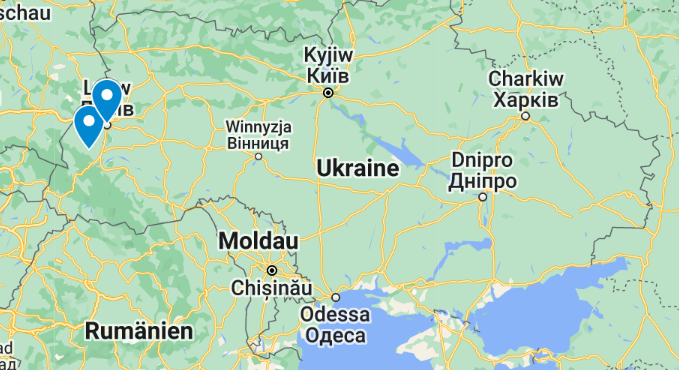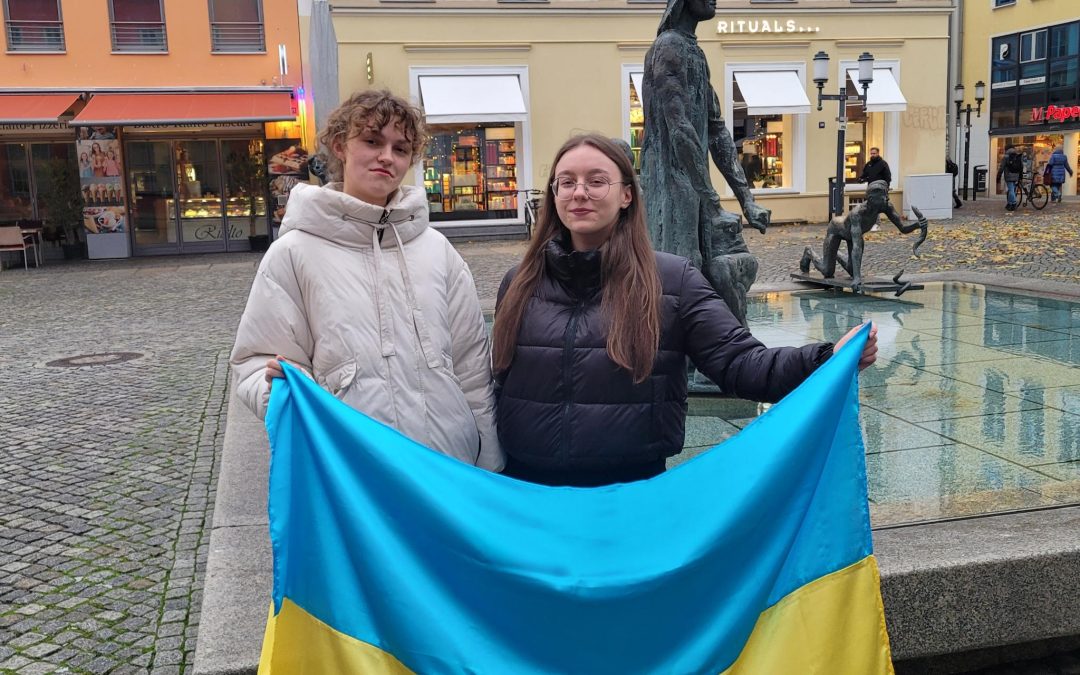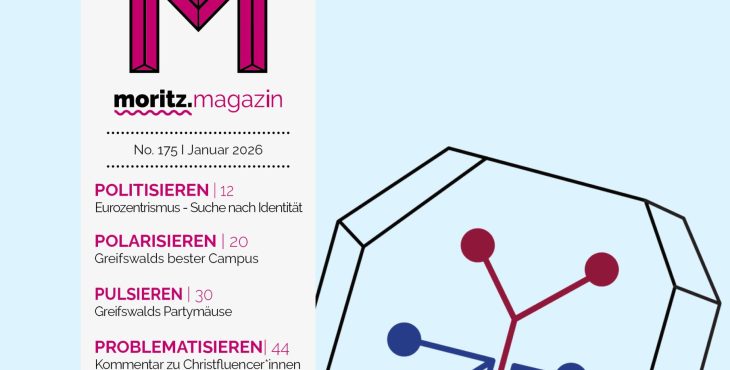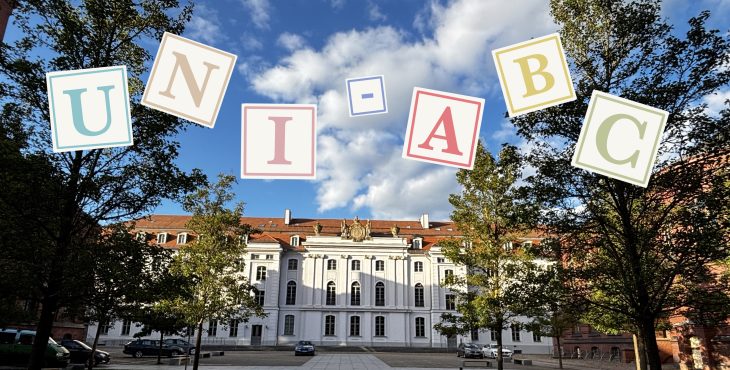For over 1,000 days Russia’s war of aggression has raged on in Ukraine. An entire nation lives in a constant state of suffering and fear, coupled with remarkable courage in the face of this threat. Amid this uncertainty, focusing on their studies is no easy task for young people. Yet Liuda and Zlata are doing just that. The two 19-year-old students from Ukraine are spending a semester abroad in Greifswald. In an interview with webmoritz., they share insights into what studying in Ukraine is currently like, what has surprised them about Greifswald, and how planning the future works in times of uncertainty.
Editorial note: To make the subject accessible to more readers, the interview, which was held in English, is published in German and English.
webmoritz.: You two have been in Greifswald since September. How has the experience been so far?
Zlata: It was really good so far. Both in terms of studying and in terms of social life.
Liuda: There is much more than I expected, as there are a lot of events that we as Internationals are invited to. People are really open and we have made friends already, so I enjoy it so far. We are mostly with other Internationals, but the exchange with local people from Greifswald is also a very nice part.
Have you met other exchange students from Ukraine in Greifswald?
Zlata: There are around ten exchange students from Ukraine, all of whom are girls. (Male students in Ukraine are still exempt from military service)
What surprised you about Greifswald and studying in Germany in general?
Liuda: The study process is not like it is in Ukraine. We can actually choose the subjects and courses we study here. In Ukraine you only have a fixed list. You can’t choose between courses. Here I can actually select what I am interested in.
Zlata: What Liuda mentioned is the most important difference. It just makes everything more interesting. For me it is easier than in Ukraine in some parts.
How long will you be in Greifswald?
Zlata: Until march. We will miss the Summer here sadly..
You are from Lviv and Drohobych. The war has been going on for over 1000 days now. How is the situation at home, how do you stay in contact with your families?
Liuda: It is a tough topic to talk about, because even though we live away from the front line, there are still missiles from Russia everyday. Just yesterday (21.11), Russia striked with an intercontinental missile for the first time in Ukraine. That was horrific. I don’t think it is gonna get any better, because the Russian aggression is still there and it has been there for over 1000 days. People, soldiers, civilians, and even children are dying under the rubble. I hope that the European Union and Germany will support us, so we can actually win the war.

With this situation in mind, what made you still do an exchange semester? Were there any extra challenges or were you even more encouraged to do it?
Liuda: Because of the war, even though it sounds horrible, there are a lot of doors that were opened to Ukrainians. There is a lot of support for us, which is great. Countries are happy to accept exchange students from Ukraine. Now, the doors are even open for male students to do exchanges. That was not possible before. But I have to say, even though I am here now, I still miss Ukraine and I will definitely come back and live my life there. My parents are happy that I am here because I am in safety here, but I still want to come back.
Are there still regular lessons being held at your home university?
Zlata: Yes, it is considered „peaceful“ because we don’t have active warfare in the region. We have offline-studying. In the eastern part of Ukraine, they study online because of the war-conditions. But if we have an air alarm then we go to the shelter and then of course there is no lecture.
Liuda: Most universities in the central and eastern parts of Ukraine are closed. We can’t complain because we don’t miss any student life. When there is an alarm we have to go to the shelter or even study there.
So there is a shelter for all students?
Zlata: Yes, for every faculty there is one. If you don’t have a shelter, there can be no studying.
Were there no extra challenges for you to do the exchange?
Zlata: For the International Department of our university it may be easier to do the agreements with other universities. For us students there is still a contest, where you must do an interview. We have to prepare documents and have good grades. But that was the same before the war.
Why did you choose Greifswald? Could you choose between many universities?
Zlata: It depends on the university. For me I chose Greifswald because the second language I learn is German. But we do have a lot of options from multiple countries.
Liuda: I study German as my first language and English as my second, so I wanted to come to Germany to improve my skills in both languages. People here surprisingly talk really good English, so it was a great choice. A friend of mine was in Greifswald before and she gave me great feedback, so I decided, why should I not try it?
What did you see outside of Greifswald? Did you go an any trips?
Liuda: I traveled to Denmark and the Netherlands, but also German cities like Hamburg, Berlin, and Nürnberg. It was really beautiful. The other things on my wish list are far away, given Greifswald’s relatively isolated geography. Köln or Düsseldorf come to my mind there.
Zlata: I wasn’t abroad yet but we went on a hiking trip to Rügen which was organized for Internationals as well as a trip to Lübeck. Next week we will go to Berlin, which is also a trip organized for the Internationals.
Looking into your future: What are your goals regarding university or jobs? How do you work towards these goals if the situation at home is so unknown?
Zlata: It is a hard question. I didn’t think of getting a masters degree but now I think that I will do a masters degree. Maybe not in Ukraine but somewhere abroad. When talking about a job, I would like to work as a translator. Of course it could be harder to do that in Ukraine because of the situation, but the field of translating is in high demand there right now. I just really hope it works out.
Liuda: It is really hard to plan things out these days. Before the war I set plans for the next few years, but now I only plan things for like the next five months. But as my my major is also in the field of translating I will work in that field, hopefully as a German and English translator. For me, the best place to work is still in Ukraine.
Is there anything that you would like to say to the people reading?
Liuda: Don’t be afraid to take a risk, even if it doesn’t work out. Do something, leave your comfort zone and meet new people.
Zlata: Nothing to add to that!
We thank Zlata und Liuda for the interview.
Beitragsbild: Simon Fortmann
Zur Person des Autoren




